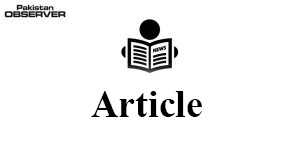Salman Ali
PROVINCE Sindh is confronted by a plethora of chronic problems. Rapid population growth, extreme poverty, poor governance and most importantly poor law and order situation have devastated the peaceful and progressive Sindhi society. It is a painful and sheer reality that our rulers and bureaucrats are unable to understand that this axiomatic truth of human resource management and good governance that without improving good governance it will not be possible to stabilise the alarming population growth rate and eradicate extreme poverty from the resources-rich province. Indeed, Sindh is not poor, it is an enviably resources-rich province in Pakistan but it has been a victim of politics of successive past rulers and even the present one to keep its people poor because the poor and illiterate people can easily be exploited to perpetuate the feudal framework or aristocracy, plutocracy or ‘waderacracy’ in Sindh province. That is what actually happening in Sindh. As I am living in Sindh from past few years, let me explain for my readers what I feel here, this province is beset with a lot of problems. Agriculture, the main source of livelihood of Sindhi people and their spiritual love, has been greatly destroyed by the feudal lords. Kidnapping for ransom is rising in various parts of the province particularly in Khairpur, Jacobabad, Kashmore, Dadu and some other interior areas.
People are abducted as desired by the Pirs & Waderas moreover, despite the legislation enacted to protect and promote women’s rights in recent years, violence against women has escalated in Sindh. In a day several women are killed in the name of honour, but nothing concrete has been done by the government. Brainless breed of bureaucrats and technocrats who are selfish to the core, rule the roost in the province today. Bribery is the norm, both, in the public and private offices. Corruption is pervasive. It has even become a symbol of status. Crime is everywhere in the province. It seems that the hardened criminals are given ‘permits’ to commit crime anywhere they feel like in the province. The courts want to give speedy justice but they suffer both from the workload and shortage of resources including the manpower, material and money. This is Sindh for us. I have just portrayed a tiny picture of Province Sindh.
However, if we talk about the education, the children of Sindh are facing many problems because of the poor education system in the province. In Sindh out of 12 million children, 6.7 million are out of school. 52 percent of these out of school children are girls. Meanwhile, 47 percent of government primary schools have to get by with only one teacher. Along with this, 50 percent of children enrolled in primary schools in Sindh drop out before finishing their primary schooling. Moreover, 27 percent of government primary schools in Sindh function only with one classroom. Throughout Sindh, 71 percent government primary school buildings are in a pathetic condition. In addition, 66 percent of schools in Sindh are without electricity, 53 percent of schools cannot provide students and staff with drinking water facilities, 49 percent of schools do not have toilets and 44 percent are without boundary walls. The so-called feudal leaders have utterly disappointed all and sundry. The law and order in upper and lower Sindh regions have gone out of hand. People are left at the mercy of dacoits. These errant rulers have never shown their commitment to bring peace, progress and prosperity in Sindh.
Importantly, within the above-mentioned districts of Sindh Hindu girls are kidnapped, forcibly converted and married to Muslims, the police, government and courts all turn a blind eye. The media is often silent on the problem of forced conversion and issues related to women. Many cases in which influential locals and religious leaders are involved go unreported because of pressure put on the media not to report the stories. As I am part of this media fraternity, I know these local reporters are often afraid to investigate the existence or prevalence of forced conversions, honour killings or any other issue related to women due to fear of attack, especially when influential members of the local community are involved. However, in recent times few officials who are appointed on merit and have passed competitive examinations and are setting extraordinary examples in all fields. Hereby, I want to acknowledge Senior Superintendent of Police-SSP Umer Tufail who has contributed every effort for maintaining law and order and rule of law in northern Sindh particularly Khairpur and Ghotki. These both districts were on the top in crime but these mentioned police officials took concrete actions and made lives easy for the public. Moreover, many women rights activities in Interior Sindh stood up in favour of women rights particularly Saira Ahmed a renowned social activist working on women, peace and security. While concluding, I appeal to CM Sindh Murad Ali Shah and Chairman PPP Bilawal Bhutto Zardari, to look after people of Sindh.
—The writer, a social activist, is based in Lahore.










